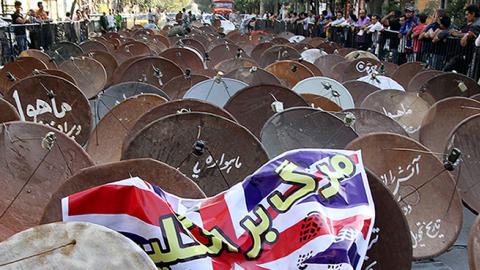On June 11 the Wall Street Journal ran an opinion piece about Radio Farda — the Persian-language news service of Radio Free Europe-Radio Liberty (RFE-RL), one of five U.S. government-supported networks that provide news and information to foreign audiences around the world.1 The author of the piece, Sohrab Ahmari, listed a dozen news items that, in his view, reveal “dysfunction” at Radio Farda.
Five items on Ahmari’s list are reports by a Farda correspondent inside Israel that contain inaccuracies suggestive of a pro-Palestinian bias. Another five characterize American critics of President Obama’s nuclear arms agreement with a Persian word that could be translated as “extremist.” And the last two items cover routine activities of President Hassad Rhouhani and his deputy in a manner that Mr. Ahmari finds unduly deferential.
This sounds pretty bad, until we step back and consider that these 12 stories appeared over a five-year period, from 2012 to 2017, during which Farda produced approximately 18,400 news reports about events in Iran and the region. Assuming that all 12 news items on Ahmari’s list are in fact biased or inaccurate, that is still less than a tenth of one percent of the total. Ahmari declined my request for an interview, so I cannot say how he obtained these 12 items. In his article he makes no claim to have sifted through five years of Farda reporting, but neither does he indicate a source. What I can report, based on interviews with RFE-RL management, is that Farda responded to his sole inquiry with a lengthy memo addressing each item, inviting him to visit RFE-RL’s Prague headquarters, and defending the work of its journalists, more than twenty of whom have in recent years been threatened and harassed—as have their families back in Iran.
Apparently Mr. Ahmari didn’t get the memo. His article makes no mention of the Iranian regime’s many hostile measures against Farda, which include not only threats and harassment directed at journalists but also costly efforts to block the service’s radio, television, and online communications. In fact, Tehran spends more money to block Farda’s programming than Farda spends to produce it.
In spite of these hostile measures, millions of Iranians use Internet proxies to access Farda. In May of this year, Farda’s website attracted 28 million page views and received over 60,000 comments, and ten million people listened to its radio programs online. These Iranians are not turning to Farda for anti-Israel rhetoric, defenses of President Obama’s nuclear arms agreement, or flattery of their rulers. They can get all that on their state-run media—without risking arrest.
As a grantee of Congress, RFE-RL is required to undergo two external reviews every year. Because Farda is the language service that receives the most criticism (from Washington as well as Tehran), RFE-RL’s management ordered an additional review this spring. The person hired to conduct the review was an experienced Western journalist fluent in Persian, who compared Farda with the other international channels penetrating Iran and concluded that, of the lot, Farda was the least biased and most independent.
Farda is not without problems. A major issue cited in every external review is the lack of reporting from inside Iran. The reason for this is simple: anyone caught reporting for Farda, or even posting a message on its website, Facebook page, or other social media, is immediately sent to prison. As noted in the memo sent to Ahmari, the official newspaper of the Supreme Leader Ayatollah Khamenei routinely calls Farda “CIA official radio.”
There was a time, not too long ago, when digital media were perceived as having the potential to liberate Iran. When the “green movement” filled the streets of Iran’s cities with protests against the rigging of the 2009 election, Western pundits dubbed it “the Twitter revolution.” But the name didn’t stick, because the movement was swiftly crushed by a combination of old-fashioned brutality and new-fangled digital repression. Today the battle continues between tech-savvy Iranians and a security state increasingly skilled at using online tools to censor, surveil, and propagandize its people.
This brings us to a second problem, one that existed before the digital age. Ahmari gets one thing right: the key mission of Farda (and of the 25 other language services at RFE-RL, as well as its four sister networks) is to provide high-quality local and regional news to audiences in countries where information is tightly controlled by a repressive regime hostile to the United States. This “surrogate news” mission involves many challenges. One of the most daunting is to teach émigrés from those same countries how to temper their oppositional passion for the sake of dispassionate reporting.
It is easy to overlook how crucial émigrés are to the whole undertaking of surrogate news. Identifying important stories in a closed society, verifying the facts, adjusting the nuances for a particular audience, then delivering the story in fluent, idiomatic language via the most effective media platforms—these are not things that Americans can do alone. They require the cooperation of émigrés. But—here’s the challenge—émigrés tend to come with baggage.
During the Cold War, when RFE-RL provided surrogate news to Eastern Europe and the Soviet Union, its dozen or so language services employed a motley assortment of characters: exiled leaders and bureaucrats, including a few former Communists; poets and pamphleteers adrift in Paris and London; native speakers raised in the West; and countless activists, all loyal to different political factions, who quarreled heatedly over who should take power once their countries were liberated.
These Cold War émigrés had the requisite linguistic and cultural savvy, but very few arrived at RFE-RL knowing how to practice good journalism. Driven by a passionate desire to end the scourge of Communism, most had grown up being hammered by Soviet propaganda (not to mention Nazi propaganda during the war). So their initial impulse was to hammer right back. It took hard work and patience to teach them the difference between propaganda and journalism.
Part of the lesson was that internecine quarrels within a given language service must not be allowed to impinge on its news operations. Once learned, this lesson stuck, because most of the men and women who became committed journalists at RFE-RL understood in their gut how easy it would be for a hostile government to exploit their particular quarrels.
But here’s a question that came up in my interviews with Farda management: What happens when you combine 21st-century digital media with overheated émigré politics? You get a third, very real problem that does not yet have a solution.
Generally speaking, RFE-RL reporters regard digital media as a blessing because along with its sister networks RFE-RL has become quite adept at using digital tools to move information into and out of closed societies. Indeed, these networks are in some ways more adept than their commercial cousins because their priority is news, not profit But unfortunately, this is not the whole story. To seasoned staff trying to teach good journalism to raw recruits, digital media can also be a curse.
Here in America, it is evident that Facebook, Twitter, and other social media blur the line between disciplined reporting and undisciplined ranting. For many young reporters (and some old ones), professional journalism, with its strict standards of veracity and objectivity, is just a day job. The real action, the stuff that stirs the blood, is on social media—especially personal accounts not monitored by employers. In that space, the best way to build trend-lines and clicks is to steer every discussion into an ever narrower, nastier gutter.
This two-tier practice is worrisome enough in the context of an open society. It is far more worrisome in the context of surrogate news, because instead of cooling the political passions of émigrés, online indulgence ignites them. In the past, RFE-RL employees understood the danger of letting hostile governments fan the flames of their internecine quarrels. Today that understanding is in danger of being lost, as all of us, not just the enemies of freedom but also its supposed friends, seek advantage in fanning our own flames.



















